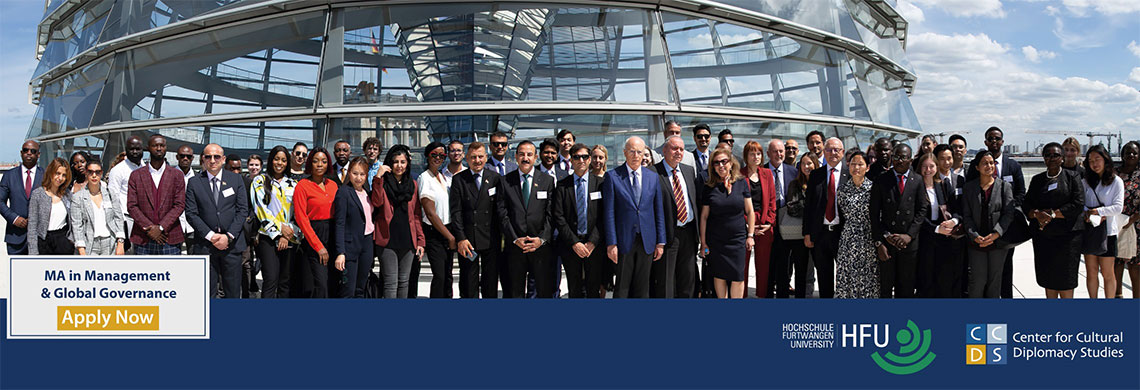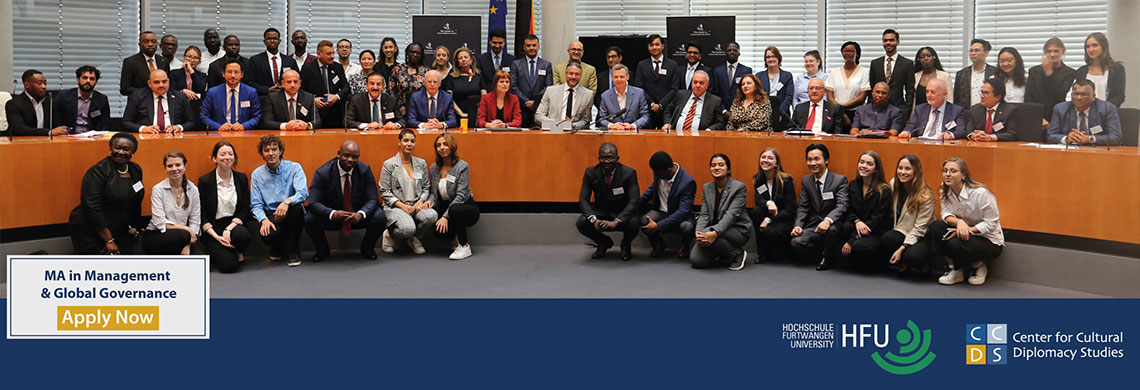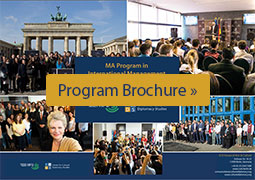The Center for Cultural Diplomacy Studies
MA in International Management and Global Governance (Short Track)
MA in International Management and Global Governance (Short Track)
Introduction
The MA in International Management and Global Governance is a 3 semesters` program offered by the Furtwangen University in partnership with the Academy for Cultural Diplomacy.Length - 3 Semesters
Location - Berlin, Germany
Professional Development - The Professional Development Training Program provides students with the opportunity to apply in practice what they learn in theory in their studies and gain valuable professional experience. The program is completed during the second semester of studies.
Tuition - €9,000
In the contemporary world, politics, finance, economy, and business, at the national and international level, have become the inter-connective forces that unites civil societies, national & regional governments, and international organizations further together. The recent global challenges highlight the urgency to rethink globalization and to improve and develop the ability of the international society to be successful in navigating in such a complicated global situation. The need for strong and decisive global and innovative political and business leaders is therefore inevitable.
The degree seeks therefore, through a multidisciplinary academic education, to provide a bridge between the distinct, but yet the connected areas of international management & global governance, incorporating the fields of international relations, cultural and public diplomacy, with an in-depth critical treatment of global governance. Students, who seek a management or leadership career on the international level, will benefit from a multidisciplinary approach, seeing the global challenges of global cooperation, and from better understanding the relationship between management on transnational level and policies of global governance.
The curriculum provides students with expertise in two distinct academic fields, combining both an academic and practical advantage in the global arena, and preparing them for employment in complex, ever-changing environments. The program addresses contemporary international issues, with classroom seminars and lectures, as well as events, conferences, professional trainings, tours, visits and meetings with foreign officials, which are incorporated into the curriculum. Students will meet with leading experts working in international organizations, embassies, and academic institutions, and will engage with specialists in the areas of international relations & economics, business, communication, politics, human rights, culture, peace building, multilateral diplomacy, conflict resolution and development.
On a practical level, the program provides students with academic and practical experience, that creates a solid foundation for careers in multinational corporations, governments, intergovernmental institutions, international organizations and NGOs. The international environment of the Center for Cultural Diplomacy Studies offers students a unique opportunity to interact with leading experts and academics at a wide variety of international organisations and research centers. Students are empowered as critical partners, working with peers and university staff to define, develop and transform the learning environment and their own learning experience. They act as collaborators and co-creators in the production of knowledge, engaging in research and investigation throughout their program of study.
A central focus is placed on integrating the teaching, research, enterprise and community engagement, to provide students with an authentic and transformative learning experience. The students will develop the disciplines knowledge and understanding, while at the same will develop key transferable skills and competencies that enhance employability.
This exceptional environment prepares students to be culturally aware, socially responsible and actively participating citizens who are globally minded and eager to work for a contemporary world increasingly characterised by uncertainty, unpredictability and ‘super-complexity’.
Start Dates »
Enrolments to the Program are possible towards the fall, winter, spring and summer semesters’ start each year. To learn about the possible Start Dates » of the program, please click HERE.
Professional Development Program »The Professional Development Program was created and developed in order to equip students with the relevant skill sets, knowledge, professional experience and professional relationships, so that they will be able to acquire a job immediately upon completion of the degree. One of the main goals of the Professional Development program is to enable students to acquire job opportunities and develop their careers in institutions such as the UN, EU, African Union, national governments, national parliaments, international corporations and international NGOs. (More) |
Program Structure
The program consists of 90 ECTS credits in total and has duration of two Study semesters, a Professional Development Training Program, designed individually for each student and a thesis to be written during the 3rd semester and to be submitted towards the completion of the program.
The program follows the conventional university structure of 3 Semesters: one-year academic program divided into two study semesters, where Students are offered facultative courses to accompany mandatory courses, a professional development experience and the final thesis to be submitted after the 3rd semester, which is dedicated to the thesis writing.
*The program is structured as a 3 Semesters’ program, however Students who wish to finalize the program earlier, are able to submit their thesis prior to the final deadline (prior to the end of the third semester).
Program Curriculum
Semester 1
The main priority of the curriculum for the first semester is to provide students with a solid foundation and understanding of the Field of Global Governance and related fields.
Mandatory Courses for Semester One are:
- Introduction to Global Governance; Concept, Methods and Agendas
- Case Studies of Global Governance: Actors, Institutions, and Issues
- International Relations & Cultural Diplomacy in the Global System in the Age of Globalization
- International Organizations
- The State as an Actor in the Global System: Public diplomacy, soft Power and digital diplomacy
- Conflict Mediation (Negotiation Methods & Peace Mediation Simulation)
- Theories of Power: Hard Power, Soft Power Smart Power
- Nation Branding: Marketing a Nation
- European Studies & Politics
- Global governance in trade, finance and common pool resources (CPR)
*Facultative Courses - The decision of the offered facultative courses in each semester is made by the CCDS faculty, in accordance with the timing period of the Semester, logistical issues as well the planned activities of the ICD during the prospective period.
Semester 2
Mandatory Courses for Semester Two are:
- Module International Management
- International Business Strategy
- Sustainable Management and Corporate Governance
- Innovation Management
- Module Managing People in a Globalized World
- Leadership
- Transcultural competence and diversity management
- Module International Economics and Finance
- International Economics
- International Financial Markets and Institutions
- Module Master Thesis
- Academic Research and Writing
Professional Development Training Program
The Professional Development Training Program provides students with the opportunity to apply in practice what they learn in theory in their studies and gain valuable professional experience. The program can be completed simultaneous to the students’ studies, between the first and second semesters, or after the second semester, during the thesis writing semester. The professional development program is designed individually with each of the students and is composed of part or all of the following main components:
- Research
- Development of own Initiative/ project, supported by the Center
- Involvement in independent Initiatives
- Internship in external Organizations, Institutes and companies
- Participating in and Contributing to ongoing Projects, Activities and Conferences
Semester 3
Master Thesis writing
Following two semesters of academic study, students will be qualified to write an in-depth analysis on the topic of their choice related to the theme of the program. Students are required to complete a master ’s Dissertation during their fourth semester of study, and will be provided with guidance on how to choose an appropriate topic, how to identify and locate the necessary sources. The topic, structure, and length of each Dissertation will be subject to individual review and Faculty mentor approval.






